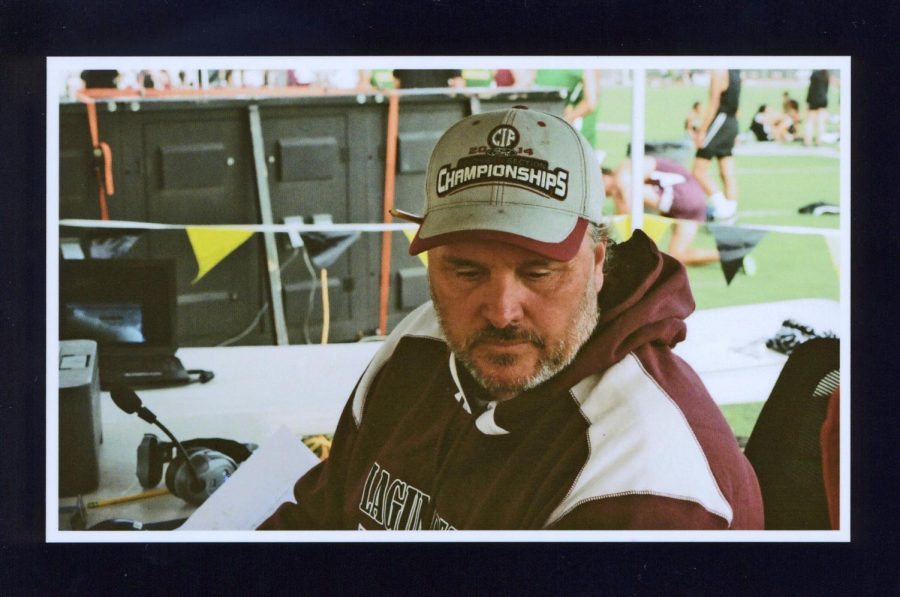Discovering more about our teachers: Scott Wittkop
Wittkop timing a track meet with the company Finished Results.
June 11, 2018
From working in fast food restaurants, to teaching at Juvenile Hall, to creating an entirely new multimedia production class and coaching cross country at LBHS, Laguna Beach High school teacher and coach Scott Wittkop has seen it all.
When I met Scott Wittkop 4 years ago as a freshman, I would never have imagined that he would become my favorite teacher and most trusted confidante on campus. The only reason we initially interacted my freshman year was convenience. One of my good friends had his class first period at the same time I had journalism, so I would frequently visit her in his classroom. Wittkop’s and my path crossed again every afternoon at 2:55 p.m. when I showed up for cross country.
Over the past four years, our interactions became more frequent and less by coincidence. I would talk to him at meets and after practices. When I was down or upset, he talked to me and made me laugh. He never talked to me like he was better or infinitely more knowledgeable. He talked to me like a whole person—like I was capable of all understanding. And, through our interactions, I learned that he was much more than just a multimedia teacher or a boys cross country coach, which is why I chose to write this profile on him. It’s important to understand that our teachers as more than just our teachers.
Wittkop was born in La Mesa, California in San Diego, and attended Helix high school where his favorite class was his printing class.
“My first job was at Pioneer Chicken, which taught me that I didn’t want to work in fast food making only $2.30/hr,” said Wittkop. “The second job I had was in a printing a job under a printing press.”
He attended a number of universities: Riverside Community College, Cal Baptist University (teaching credential), Azusa Pacific University (masters), National University (2nd masters), Long beach University, & UCSB (teaching credential).
“My first real profession was being a manager in a commercial print shop. I did that until I was 28 and saw that that industry was dying because of computers,” said Wittkop. “So I had had an early mid-life crisis and realized i needed to decide what i wanted to be when i “grew up”, and I decided I wanted to become a high school football coach, and the best way to do that was to become a teacher. So i quit my job and went back to school.”
Wittkop first began teaching at F.H. Butterfield Juvenile Hall in the lock-up ward. He taught kids that had been arrested for rape, murder, grand theft auto, stabbing, etc.
“I had a guard inside the classroom with me at all times. The students would come into the classroom from their individual cells and then go back to their cells when class ended,” said Wittkop. “Teaching there taught me how to control a classroom, making sure that when the kids walked in they knew who was in charge.”
After leaving F.H. Butterfield, Wittkop went to teach third, fourth, and fifth graders who were severely mentally and emotionally disturbed.
“These kids that I thought, this was their last opportunity to learn how to behave before they actually went into lock up facilities. I learned a lot about behavioral management while teaching there,”said Wittkop. “Teaching there not only helped me when I moved into teaching at a regular high school, but also as a parent—having a set of rules and expectations for the kids to succeed.”
After marrying his wife, Wittkop decided that he had to make a change in his job and applied to work at La Sierra High School. There he taught and coached football.
“I had a player with MS, his name was Angel, and at that time I was the head freshman coach and the “player of the game” each game would get to dress in varsity that week,” said Wittkop. “So we were on the eighth game of the year and the kid who was nominated to dress up came up to me and told me ‘I think we need to give it to Angel this game.’”
Wittkop realized in that moment that’s why he wanted to be a coach and with kids— for the bonding of the kids, regardless of their backgrounds.
“They had already prepared everything for Angel, so Angel got to dress in varsity. It was amazing to see how much he became a part of the team. We never treated him different: he did the same drills and workouts. He told me that was the best experience he ever had because we didn’t treat him differently,” said Wittkop.
The principal at La Sierra High School then became the principle of Laguna Beach High school. He called Wittkop, telling him Laguna had an opening, and asked if he wanted to teach there. Initially, Wittkop didn’t want to go, but when he called his wife and she told him to take the job, and he has been teaching here for twelve years.
When Wittkop started at LBHS, he was a special education teacher until Mr. Billinger proposed the idea of needing more ROP classes on campus. Because Wittkop had owned his own screen printing business and had done screen printing in high school, he proposed the idea for a class.
The class was initially run at night where the math lab is, and eventually it became a full-time class with not only screen printing.
In addition to simply teaching his students about the course material, in his class, and with his athletes Wittkop has previously told me that he doesn’t mind sharing his life stories because he believes that if his students can learn something from his life—be it mistake or success—then it is beneficial.
“I’ve had a pretty good life, but I’ve also had some hard times, and I feel like sharing that with my students not only gives them hope during rough times, but also makes me appear more real to them,” said Wittkop. “I’ll share my mistakes and I’ll share what I did well. Teachers are people just like they are. I feel like they’re all a part of my life and and that I am a part of theirs, so I think that in that respect we should share a bit of our lives together.”
When Wittkop’s third child was born, he decided to give up coaching football to spend more time at home.
“I always had said that I am taking one year off and then I’m coming back,” said Wittkop.
At that time Wittkop was also coaching boys track. Then, the—as Wittkop put it—”legendary” Dave Brobeck stepped down from coaching cross country after winning a State title. So the athletic director came to Wittkop and asked him if he wanted to take the position of boys head cross country coach.
“I laughed and said ‘what did you really want to see me for?’ and he told me that he wasn’t kidding, and I left,” said Wittkop. “About a week later, the principal called me in and tried to persuade me, and I told him, ‘I’m a football coach. Have you looked at me? I’m not a runner.’ Coach Lalim told me he’d help me out, and every couple of weeks the school called me, asking me to coach.”
In the end Wittkop took the job under one condition: he would coach cross country for one year and then return to football—that was eight or nine years ago. His first year coaching, the cross country team qualified for CIF State Championships and placed 5th.
“Cross country has a completely different mentality and type of kid. I initially felt like I was writing or throwing with my left hand. I had reinvent myself as a coach. Cross country is more of a family kind of sport than football was for me,” said Wittkop. “I learned how to coach students in different ways and motivate them in different ways. I think if I ever went back to coaching football I’d be a completely different coach, and perhaps not even as good.”
After immersing himself in the world of cross country and track, learning about the meets and how they are run, Wittkop discovered that the way the meets were timed was inefficient.
“When I first became the track coach I would watch 4 or 5 people hand time kids and all the times were wrong—the kid in third place would have a better time than the kid in first place. So I went to the booster club and we raised money for the timing system,” said Wittkop.
Nobody wanted to run the timing system but Wittkop, so he learned how to run it by himself. This led to him joining with one of the largest timing companies in the country: Finished Results.
“I got to know the owner through timing my own meets, and he would ask me every once in a while to come help out on a Saturday and I would do it,” said Wittkop.” Then when I resigned from coaching track a few years back he asked me to time a few meets for him.”
Pretty soon Wittkop was timing four or five meets a week.
‘The thing I like about it is I’m still involved with the sport and get to see our kids compete because I time most of the events they’re at. I get to watch other coaches deal with their athletes, which helps me learn what they do well, so I can incorporate that into my own coaching,” said Wittkop.
Wittkop has immersed himself in many different jobs and take ahold of innumerable opportunities that have led him to where he is today. He claims that seizing these opportunities are the most important decision he’s made in his life is not to be static. He claims the person who has encouraged him to seize these opportunities, make these changes, the most is his wife.
“Going from teaching at Juvenile hall to teaching severely emotionally disturbed kids to La Sierra to Laguna Beach, from special education to multimedia production and design, those decisions were all risky,” said Wittkop. “Change for everyone is scary, and I am fortunate to have landed here, with this classroom that I have and this equipment that I have, and sharing that with students. Seize the moments as they come and don’t be afraid to take them.”
Sometimes the moments that shape one’s coaching career aren’t only winning a State title or traveling to another country. Sometimes it’s the lessons one learns from his athletes that shape their career the most.
“I had this student and we didn’t see eye to eye—he didn’t like me and I wasn’t fond of him. I called him into the classroom one day and said, ‘I know you don’t like me, why?’ and he told me. He told me the things I did that bothered him, and I told him that the next time that happened that he should come and talk to me,” said Wittkop. “By his senior season he called me dad, and my kids and I called him son, and he every time he comes back from college he comes to visit me.”
“It’s a great thing as a teacher to see a student that you struggled with, and have a student that struggles with you, and learn how to communicate and step outside yourself. I think that was a huge moment me not only as a coach, but also as a teacher,” said Wittkop.
From running cross country myself, I can say that dedicating four years to a sport bonds athletes to their coaches. Our coaches in cross country are like our second fathers. By the time we we graduate I think it’s safe to say we are leaving behind a second family.
“I think I can say that, beyond my family, Wittkop has been the most influential adult in my life, said senior Luc LaMontagne, who has run for Wittkop for four years. “He inspired me to run fast and put in 100% of my effort. I have, and would again, run till I puke or pass out for him. But he also inspires me to be a better person, hopefully I can be like him.”







